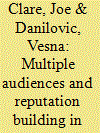| Srl | Item |
| 1 |
ID:
101682


|
|
|
|
|
| Publication |
2010.
|
| Summary/Abstract |
Reputational theory of conflict behavior dates back to Schelling's seminal work on bargaining and continues to find both its advocates and critics to date. The authors do not take sides in this debate about the relevance of reputation for bargaining behavior but rather take a modified approach to reputations for resolve and probe some aspects that were largely underexplored in past research. The authors develop the argument that, if facing multiple strategic rivals and having failed in past disputes, a state has an incentive to invest in its reputation for resolute behavior by initiating and escalating conflicts. Their focus is then on both general and immediate deterrence, and while it was standard to tie reputation to a deterrer's past, the authors direct the attention to the challenger's reputation as a potential motivator for its conflictual behavior. This new focus is validated, and the related expectations supported, in the findings from their empirical analysis of strategic rivalries from 1816 to 1999.
|
|
|
|
|
|
|
|
|
|
|
|
|
|
|
|
| 2 |
ID:
155454


|
|
|
|
|
| Summary/Abstract |
How does nation branding reflect state–society relations and more pertinently, what does it reveal about the way political power is legitimated by a given state and why? This question seldom receives attention in the rapidly expanding scholarship on nation branding. This article examines and interprets national branding processes in post-apartheid South Africa within the context of larger efforts by political elites to legitimate the new state and society and to address some of the complex legacies of the apartheid past. These efforts targeted domestic and international audiences in distinctive ways, intertwined foreign and nation-building policies, and sought to communicate key ideas about South Africa as state and nation and about the state’s role in the wider world order. The article considers how different groups of state-linked actors participated in exercises of legitimation and the discursive mechanisms that were relied on. Three such mechanisms are highlighted: (i) the construction of a distinct African-style modernity (here termed Afro-modernity); (ii) claims of South African exceptionalism articulated in boosterist branding campaigns; and (iii) expressed, variously through foreign policy signals, diplomatic posturing and hallmark events, the projection of a national role conception as leader on the African continent and of the Global South. These compound political processes had ambivalent and incomplete outcomes, however. This article considers why and what the implications are for the South African state and its society.
|
|
|
|
|
|
|
|
|
|
|
|
|
|
|
|